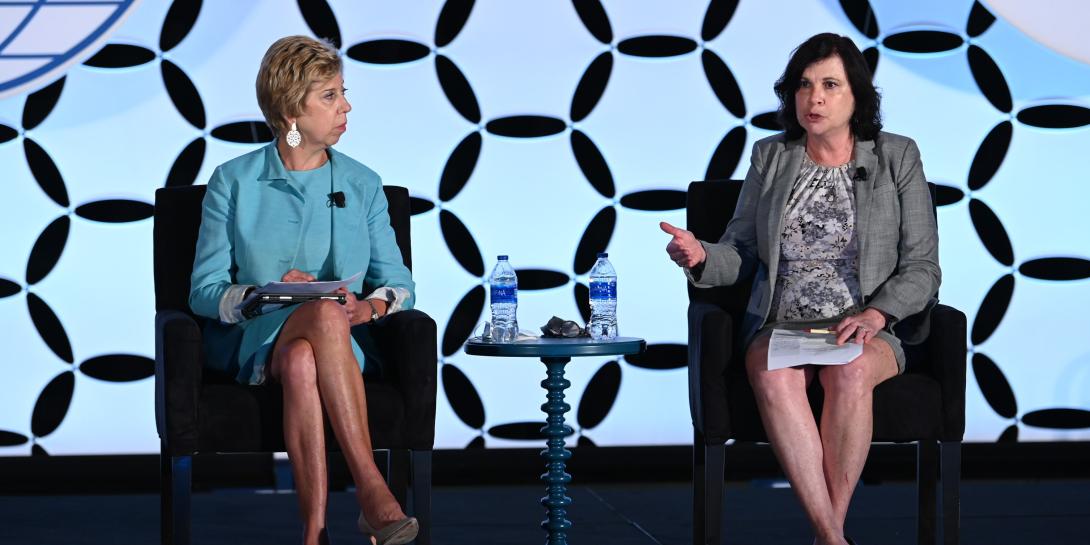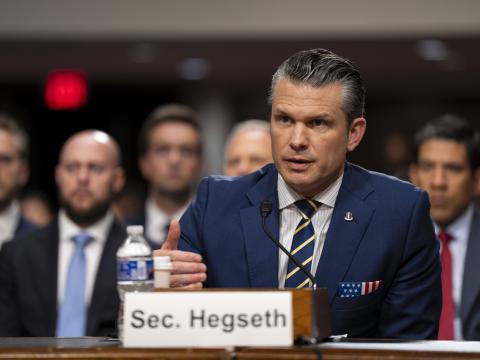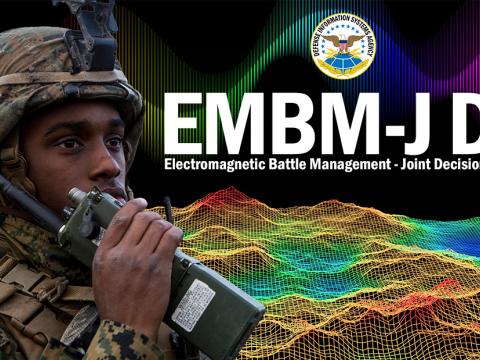Tighter Defense Supply Chain Control Doesn’t Mean Exclusive Domestic Production
The intelligence supply chain needs prompt attention, but any solutions do not necessarily require moving all production back to the United States. The country can rely on some critical sources overseas, but it cannot expect just any vital component to be available any time it is needed.
These points were among those discussed in a one-on-one conversation on the first day of the Intelligence and National Security Summit, hosted by AFCEA and INSA and being held at the Gaylord Convention Center near Washington, D.C., September 13-14. Ellen Lord, the former undersecretary of defense for acquisition and sustainment, led the conversation with Christine Michienzi, chief technology officer, Office of the Deputy Assistant Secretary of Defense for Industrial Policy.
Lord set the tone for the conversation in her opening remarks. “The security and resiliency of the defense supply chain is very critical now,” she stated. Both experts agreed that the COVID pandemic illustrated the vulnerabilities in the supply chain, and potential actions by adversaries loom if international tensions should escalate.
The security and resiliency of the defense supply chain is very critical now.—Ellen Lord, former USD for Defense, Acquisition and Sustainment #IntelSummit21
— Bob Ackerman (@rkackerman) September 13, 2021
“We have recognized that relying too heavily on a supply chain that may be too vulnerable during a time of extreme crisis may not be a good strategy,” Michienzi added.
We have recognized that relying too heavily on a supply chain that may be too vulnerable during a time of extreme crisis may not be a good strategy—Christine Michienzi, CTO, Office of the Deputy Assistant Secretary of Defense for Industrial Policy #IntelSummit21
— Bob Ackerman (@rkackerman) September 13, 2021
But simply bringing all offshore production back to the United States is not the answer. That would require huge expenditures and generate logistical nightmares. And, it is not necessary.
“The United States has never had and never will have a completely domestic supply chain,” Michienzi pointed out.
The U.S. has never had and never will have a completely domestic supply chain.—Christine Michienzi, CTO, Office of the Deputy Assistant Secretary of Defense for Industrial Policy #IntelSummit21
— Bob Ackerman (@rkackerman) September 13, 2021
The technology supply chain from many allies, such as Japan, serves the United States well. The United States can continue to rely on these countries to continue to provide needed materiel. However, efforts to build additional facilities domestically can help ensure that other countries whose supply chains are more fragile have backup when needed. Michienzi noted that the global microelectronics industry has no surge capability, which is now apparent as a chip shortage imperils construction of key products such as automobiles.
The key to protecting overseas sources is to tighten standards and requirements, the experts said. This responsibility will fall on both large and small businesses, primes and subcontractors.
One key aspect is information security, and Michienzi briefly discussed the new Cybersecurity Maturity Model Certification (CMMC). Adherence to that will impact supply chain security in cyberspace, and some changes are afoot. The department is working on those changes for presentation to industry.
“We are revising the CMMC plan, but it will be rolled out,” she offered.
The defense industrial base is the nexus of economic security and national security.—Ellen Lord, former USD for Defense, Acquisition and Sustainment #IntelSummit21
— Bob Ackerman (@rkackerman) September 13, 2021
Lord pulled no punches in her description of the importance of the supply chain to the military and the economy at large. “The defense industrial base is the nexus of economic security and national security,” she declared.





Comments